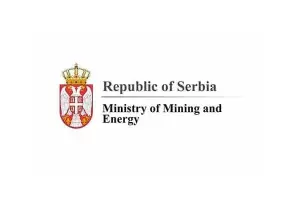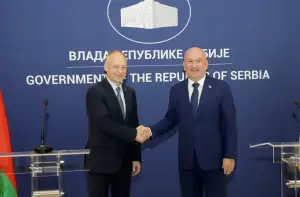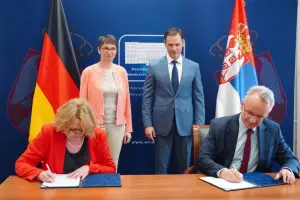- Serbia
Get to know Serbia
- Citizens
Culture and science
Health services
Pension and disability insurance
- Business
Employment
Economy
- Media
- Government
- Contact
Keep in touch
Contact form
Back
Keepin touch
Whether you have a question, comment, suggestion or any problem in the purview of the government, send us your message and we will try to respond as soon as possible. If your problem is not in our purview, we will forward your message to the relevant institution.
Q:
A:
World Bank to give Serbia $600m in next four years
Belgrade/Washington,
14 December 2007
The World Bank said today that it will place approximately $600 million at the Serbian government's disposal in the next four years, under conditions that are at the same level or better than what Serbia might get from any other source.
The World Bank’s Belgrade Office said that this bank stated today that great structural economic reforms have been carried out in Serbia in the past six years, owing to which average income of its citizens almost doubled and poverty decreased by more than 30%.
At a session in Washington, the Board of Executive Directors commended the signing of the Stabilisation and Association Agreement between Serbia and the EU and acknowledged Serbia’s significant development since it inherited membership in the World Bank Group in 2001. The World Bank pointed out that Serbia is yet to carry out many important reforms if it wants to complete its economic transition, and added that at this moment the regional stability is of special importance for further economic development of Serbia and the region and its faster integration into Europe.
The World Bank Board of Executive Directors approved the document called "Country Partnership Strategy (CPS) for Serbia for the period 2008-2011".
The World Bank Group's support for Serbia, envisaged by CPS, which is in accordance with Serbia’s goal concerning European integration, will be aimed at three priorities defined by the Serbian government.
The first priority is encouraging development based on a dynamic private sector in order to secure further income growth and approaching the EU levels. The second priority is providing opportunities for as many segments of society as possible to feel benefits from economic growth, and the third one is management of new risks caused by environmental pollution and natural disasters.
Through this strategy, the World Bank will support efforts of the Serbian government to continue with economic achievements and use its chance for the future, stated World Bank Director for the Western Balkans Orsalia Kalantzopolis. She said that this is a great change compared to six years ago when Serbia was focused on breaking away from its past.
The World Bank Group will be flexible in provision of inventive financial products and detailed analyses services so it could react to new needs and demands coming from Serbia as sophisticated country with medium-level income.
Chief of the World Bank Office in Serbia Simon Gray said that the World Bank will set aside approximately $600 million for the Serbian government in the next four years, and pointed out that these are additional means in relation to $740 million which the World Bank has provided to Serbia since 2001, mostly in loans under concessions.
The International Financial Corporation, a part of the World Bank Group dealing with the private sector, also envisages significant new investments in Serbia, in addition to almost $340 million invested by now.
The Multilateral Investment Guarantee Agency (MIGA) secured guarantees worth over $425 million and will investigate further possibilities for supporting foreign investments that promote growth and employment in Serbia, it is added in the statement.
At a session in Washington, the Board of Executive Directors commended the signing of the Stabilisation and Association Agreement between Serbia and the EU and acknowledged Serbia’s significant development since it inherited membership in the World Bank Group in 2001. The World Bank pointed out that Serbia is yet to carry out many important reforms if it wants to complete its economic transition, and added that at this moment the regional stability is of special importance for further economic development of Serbia and the region and its faster integration into Europe.
The World Bank Board of Executive Directors approved the document called "Country Partnership Strategy (CPS) for Serbia for the period 2008-2011".
The World Bank Group's support for Serbia, envisaged by CPS, which is in accordance with Serbia’s goal concerning European integration, will be aimed at three priorities defined by the Serbian government.
The first priority is encouraging development based on a dynamic private sector in order to secure further income growth and approaching the EU levels. The second priority is providing opportunities for as many segments of society as possible to feel benefits from economic growth, and the third one is management of new risks caused by environmental pollution and natural disasters.
Through this strategy, the World Bank will support efforts of the Serbian government to continue with economic achievements and use its chance for the future, stated World Bank Director for the Western Balkans Orsalia Kalantzopolis. She said that this is a great change compared to six years ago when Serbia was focused on breaking away from its past.
The World Bank Group will be flexible in provision of inventive financial products and detailed analyses services so it could react to new needs and demands coming from Serbia as sophisticated country with medium-level income.
Chief of the World Bank Office in Serbia Simon Gray said that the World Bank will set aside approximately $600 million for the Serbian government in the next four years, and pointed out that these are additional means in relation to $740 million which the World Bank has provided to Serbia since 2001, mostly in loans under concessions.
The International Financial Corporation, a part of the World Bank Group dealing with the private sector, also envisages significant new investments in Serbia, in addition to almost $340 million invested by now.
The Multilateral Investment Guarantee Agency (MIGA) secured guarantees worth over $425 million and will investigate further possibilities for supporting foreign investments that promote growth and employment in Serbia, it is added in the statement.
-
 Belgrade, 21 July 2025
Belgrade, 21 July 2025Construction of oil pipeline with Hungary to begin early next year
-
 Belgrade/Athens, 17 July 2025
Belgrade/Athens, 17 July 2025Serbia continues to align with EU in field of energy
-
 Kostolac, 14 July 2025
Kostolac, 14 July 2025First solar power plant Petka in Kostolac put into trial operation
-
 Belgrade, 11 July 2025
Belgrade, 11 July 2025Potential for improving cooperation with Belarus in many areas
-
 Požega, 5 July 2025
Požega, 5 July 2025Section of Pakovraće - Požega highway officially opened
-
 Belgrade, 2 July 2025
Belgrade, 2 July 2025Technical specifications defined for Serbia-Hungary oil pipeline
-
 Belgrade, 30 June 2025
Belgrade, 30 June 2025IMF confirms Serbia successfully implementing all agreed reforms
-
 Belgrade, 27 June 2025
Belgrade, 27 June 2025Double Taxation Avoidance Agreement with Germany signed
-
 Kostolac, 25 June 2025
Kostolac, 25 June 2025Construction of Kostolac wind farm nearing completion
-
 Belgrade, 24 June 2025
Belgrade, 24 June 2025Government supports request for new postponement of sanctions against NIS
